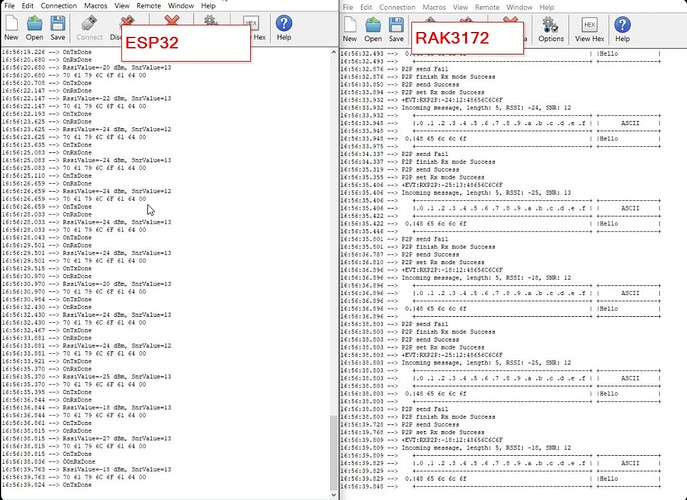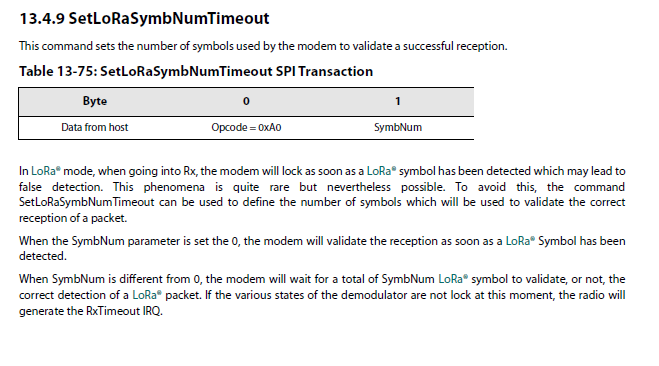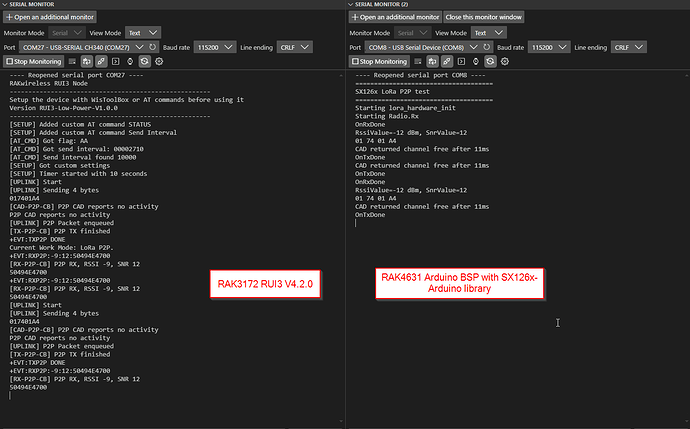I run a test this afternoon, communicating from the RAK3172 (RUI3) to a RAK11200 + RAk13300 (ESP32 and SX1262 module) and they talked to each other without any problems.
On the RAK3172 I set these parameters:
double myFreq = 916000000;
uint16_t sf = 7, bw = 125, cr = 1, preamble = 8, txPower = 22;
and initialized with
Serial.printf("Set Node device work mode %s\r\n", api.lorawan.nwm.set(0) ? "Success" : "Fail");
Serial.printf("Set P2P mode frequency %3.3f: %s\r\n", (myFreq / 1e6), api.lorawan.pfreq.set(myFreq) ? "Success" : "Fail");
Serial.printf("Set P2P mode spreading factor %d: %s\r\n", sf, api.lorawan.psf.set(sf) ? "Success" : "Fail");
Serial.printf("Set P2P mode bandwidth %d: %s\r\n", bw, api.lorawan.pbw.set(bw) ? "Success" : "Fail");
Serial.printf("Set P2P mode code rate 4/%d: %s\r\n", (cr + 5), api.lorawan.pcr.set(0) ? "Success" : "Fail");
Serial.printf("Set P2P mode preamble length %d: %s\r\n", preamble, api.lorawan.ppl.set(8) ? "Success" : "Fail");
Serial.printf("Set P2P mode tx power %d: %s\r\n", txPower, api.lorawan.ptp.set(22) ? "Success" : "Fail");
api.lorawan.registerPRecvCallback(recv_cb);
api.lorawan.registerPSendCallback(send_cb);
Serial.printf("P2P set Rx mode %s\r\n", api.lorawan.precv(3000) ? "Success" : "Fail");
On the ESp32 (RAK11200)
// Define LoRa parameters
#define RF_FREQUENCY 916000000 // Hz
#define TX_OUTPUT_POWER 22 // dBm
#define LORA_BANDWIDTH 0 // [0: 125 kHz, 1: 250 kHz, 2: 500 kHz, 3: Reserved]
#define LORA_SPREADING_FACTOR 7 // [SF7..SF12]
#define LORA_CODINGRATE 1 // [1: 4/5, 2: 4/6, 3: 4/7, 4: 4/8]
#define LORA_PREAMBLE_LENGTH 8 // Same for Tx and Rx
#define LORA_SYMBOL_TIMEOUT 0 // Symbols
#define LORA_FIX_LENGTH_PAYLOAD_ON false
#define LORA_IQ_INVERSION_ON false
and then the usual initialization with the SX126x-Arduino library
// Initialize the Radio callbacks
RadioEvents.TxDone = OnTxDone;
RadioEvents.RxDone = OnRxDone;
RadioEvents.TxTimeout = OnTxTimeout;
RadioEvents.RxTimeout = OnRxTimeout;
RadioEvents.RxError = OnRxError;
RadioEvents.CadDone = NULL;
// Initialize LoRa chip.
lora_rak13300_init();
// Initialize the Radio
Radio.Init(&RadioEvents);
// Set Radio channel
Radio.SetChannel(RF_FREQUENCY);
// Set Radio TX configuration
Radio.SetTxConfig(MODEM_LORA, TX_OUTPUT_POWER, 0, LORA_BANDWIDTH,
LORA_SPREADING_FACTOR, LORA_CODINGRATE,
LORA_PREAMBLE_LENGTH, LORA_FIX_LENGTH_PAYLOAD_ON,
true, 0, 0, LORA_IQ_INVERSION_ON, TX_TIMEOUT_VALUE);
// Set Radio RX configuration
Radio.SetRxConfig(MODEM_LORA, LORA_BANDWIDTH, LORA_SPREADING_FACTOR,
LORA_CODINGRATE, 0, LORA_PREAMBLE_LENGTH,
LORA_SYMBOL_TIMEOUT, LORA_FIX_LENGTH_PAYLOAD_ON,
0, true, 0, 0, LORA_IQ_INVERSION_ON, true);



